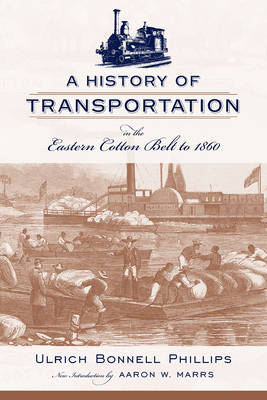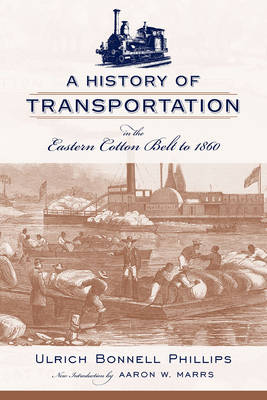
- Retrait gratuit dans votre magasin Club
- 7.000.000 titres dans notre catalogue
- Payer en toute sécurité
- Toujours un magasin près de chez vous
- Retrait gratuit dans votre magasin Club
- 7.000.000 titres dans notre catalogue
- Payer en toute sécurité
- Toujours un magasin près de chez vous
A History of Transportation in the Eastern Cotton Belt to 1860
Ulrich Bonnell PhillipsDescription
A wealth of information on antebellum railroads in South Carolina and Georgia, including their financing, profits, and traffic
A History of Transportation in the Eastern Cotton Belt to 1860 (1908) was Southern historian Ulrich Bonnell Phillips's first major monograph and has stood for over a century as one of the principal studies of transportation in the antebellum South. In this work Phillips (1877-1934) used a detailed exploration of the development of the railroad systems in Georgia and South Carolina to probe the structure, accomplishments, and limitations of the antebellum Southern economy.
For Phillips the region's economic identity as a producer of staple crops determined its transportation priorities. He carefully outlined the restrictions and opportunities created by Southern geography, economy, and labor structure as a precursor to his examination of every railroad corporation established in South Carolina and Georgia before the Civil War.
If railroads represented an outstanding accomplishment of the South, Phillips argued, the railroads also demonstrated the limits of the antebellum economy. Although railroads were essential to the South's livelihood, the technological revolution did not transform the region or liberate it from the the cotton- and slave-based economy that Phillips believed stunted its growth. Phillips saw Southern railroads chiefly as an improvement in carrying staple goods to the coast--as part of a traditional economic system--rather than dynamically contributing to the region's evolution and diversification.
This Southern Classics edition includes a new introduction by Aaron W. Marrs that chronicles the circumstances surrounding Phillips's writing of this book and illustrates how contemporary historians continue to debate the social and economic issues Phillips raised.
Spécifications
Parties prenantes
- Auteur(s) :
- Editeur:
Contenu
- Nombre de pages :
- 448
- Langue:
- Anglais
- Collection :
Caractéristiques
- EAN:
- 9781570039652
- Date de parution :
- 11-02-11
- Format:
- Livre broché
- Format numérique:
- Trade paperback (VS)
- Dimensions :
- 150 mm x 226 mm
- Poids :
- 598 g







